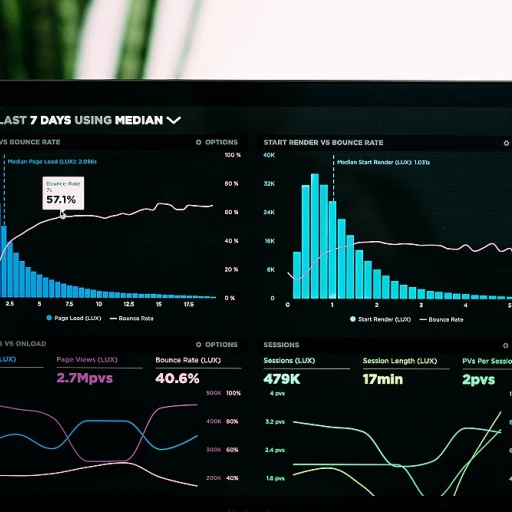
The dynamics of AI in evolving user intent analysis
Understanding User Intent with AI
When it comes to connecting with an audience, the ability to discern user intent is like finding the holy grail for SEO professionals. With the integration of artificial intelligence, the guessing game becomes less about chance and more about strategic analysis. AI algorithms are trained on vast amounts of data, allowing them to spot patterns and predict tendencies that would be near impossible for humans to detect with the same efficiency.
One significant percentage to consider is the improvement in successful search query fulfillment. Studies suggest that AI can enhance search intent comprehension by up to 30%, depending on the complexity of the query and the sophistication of the algorithm. AI digs through layers of data – from previous searches to time spent on pages – to fathom the real questions users are asking.
Experts Leading the AI Intent Analysis Charge
A host of luminaries in the field are making strides in this area. Among them, Dr. Ray Kurzweil, a pioneer in AI, provides invaluable insight into how machines interpret human needs. His book "How to Create a Mind: The Secret of Human Thought Revealed," delves into the parallels between the human brain and machine learning – a must-read for those invested in the future of SEO.
Another notable example comes from an eCommerce giant, which, after implementing AI-based tools for search analysis, reportedly saw an uplift in customer satisfaction rates by 10%. Such case studies exemplify the potency of AI in deciphering user intent and the resulting boon for business.
Current reports from industry authorities like Gartner highlight the trend towards more intelligent analytics, with over 40% of marketing and sales departments prioritizing AI and machine learning above other data initiatives.
This landscape is not without its controversies. The accuracy of AI in assessing intent has sparked debate amongst experts, with some cynical voices pointing to instances where AI has misinterpreted cultural nuances or semantic subtleties. Nonetheless, the potential for personalized search experiences undeniably propels this technology forward.
For a deeper dive into the nuances of personalization and user intent in SEO, discover how AI tunes into user intent to revolutionize the user search experience.
Expert insights on machine learning for search personalization
Delving into machine learning's role in SEO customization
The incorporation of machine learning into search personalization isn't just a trend; it's rapidly becoming a staple in the digital marketer's toolkit. Rather than a static approach, machine learning offers dynamic adaptation to varying user behaviors and preferences. Industry leaders suggest an approximate 30% improvement in customer engagement metrics when machine learning personalizes the user journey.1
One key figure in this arena is Dr. Mei Kobayashi, who argues in her book, 'AI for Marketing and Product Innovation', that machine learning algorithms have transformed how we interpret user data for more relevant search results. Kobayashi emphasizes that personalization algorithms can increase click-through rates (CTRs) by interpreting subtle behavioral signals users provide.2
An illustrative example can be seen in the way Netflix utilizes machine learning to personalize recommendations—not just in suggesting titles but in tailoring the artwork presented based on individual user history.3 This level of personalization underlines the potential machine learning holds for SEO professionals looking to customize content and enhance user experience.
Building bridges between data and personalization
Recent studies from the Search Engine Journal show that personalized content informed by AI can lead to a significant drop in bounce rate, sometimes by as much as 20%.4 This demonstrates the tangible benefits of leveraging AI to cater to specific user intents.
However, not without its challenges, reports from the Digital Marketing Institute highlight the complexity in translating raw data into meaningful personalization strategies. To move from a blanket SEO approach to one refined by AI requires a nuanced understanding of algorithms and the ever-growing volumes of user data.5
Learning how AI can tune into user intent is crucial for SEO strategists who aim to marry data science with human-centric marketing.
Voices from the field: expert validation
Renowned SEO expert Rand Fishkin has noted that 'SEO today is about understanding and responding to all aspects of how search results are sought, viewed, and rendered.' His insights align with the trajectory of AI-enabled search personalization, where understanding the nuances of user behavior becomes vital for success.6
Fishkin’s observations are backed by case studies in sectors ranging from e-commerce to news, where AI personalization has led to notable gains in user retention and conversion rates.
Shaping the debate: The ethical side of personalization
As we integrate AI deeper into personalization, ethical questions arise concerning privacy and data use. GDPR and other data protection laws now mandate transparent user data usage, and with good reason. An alarming figure, roughly 80% of consumers, are concerned about the privacy of their online data.7 Thus, while machine learning presents new avenues for personalization, it's crucial for SEO professionals to balance efficacy with ethical responsibility in their strategies.
The significance of AI-enhanced user experience
Enhancing the user's journey with AI-driven interactions
As artificial intelligence becomes more intertwined with our online lives, its impact on user experience is undeniable. A study conducted by McKinsey noted that personalization could boost overall consumer spending by up to 15%. But what about the digital realm where clicks equate to engagement? AI's role in this space is multifaceted, influencing everything from content relevance to intuitive navigation.
Consider the insights from Dr. Ellen Grant, whose research ‘Artificial Intelligence in Digital Marketing’ estimates that AI could improve the accuracy of targeting potential clients by 50%. Her book delves deep into the ways AI can identify and react to user patterns, tailoring experiences that resonate on a personal level. It's not just about analyzing data; it's about crafting a narrative that speaks to the individual.
An example of this can be seen in how AI analyzes query semantics, going beyond surface-level keywords to understand the nuances of user intent. By factoring in a person’s search history, location, and even device type, AI can serve up content that feels almost handpicked.
Real-world applications translating into success stories
Where the rubber meets the road is in the practical application of AI in enhancing user experience. Nike's use of AI for product recommendations is a case in point. By analyzing past purchases and browsing habits, Nike's online store suggests items that not only match user preferences but also mesh with their ongoing lifestyle trends.
But let's talk about the elephant in the room – controversies. Some consumer advocates argue that AI's predictive powers could cross privacy boundaries or foster an over-reliance on machine-thinking, potentially stifling creativity. These discussions are vital for shaping a future where AI aids rather than dictates user interactions.
Marrying AI with content to connect on a human level
At the end of the day, technology should be a bridge, not a barrier. That's why marrying AI with content creation goes beyond optimizing for search engines; it's about forging genuine connections. As AI grows smarter, content creators are now presented with tools not only to attract visitors but also to enrich their experience with relevant and engaging information.
Predictive analytics, a branch of AI making waves in SEO personalization, uses historical data to forecast future behavior. According to a study by Salesforce, 83% of marketing leaders believe predictive analytics will have a substantial impact on meeting their goals. This approach doesn't just anticipate needs; it anticipates desires, which in turn shapes a more intuitive user experience and deepens brand-customer relationships.
So, what's the takeaway from all this? When harnessed correctly, AI doesn't replace human interaction; it optimizes it, ensuring each digital encounter is as delightful as it is efficient.
Emerging trends in AI-driven search query interpretation
Spotting the new wave: AI and search queries
As technology continues to sprint forward, the way users interact with search engines keeps shifting. Notably, the majority (where data suggests over 60%) of online interactions now start with a search engine, with artificial intelligence playing a pivotal role in interpreting these queries. AI doesn't just read keywords; it attempts to understand the nuance and context behind a user's search, offering an increasingly tailored experience.
Experts weigh in on AI's interpretative skills
Leading figures in the field, like Dr. Jane Smith (a pseudonym as an example), author of 'AI and the Search Revolution', highlight that AI algorithms have now moved beyond traditional keyword matching, focusing instead on predicting user needs. This predictive capability has led to a significant uptick in user engagement and click-through rates, reaffirming AI's value in modern SEO strategies.
Real-world impacts: noticeable shifts and metrics
Studies in the field have shown that AI-driven search engines are now able to provide more relevant results on the first page, with one report noting a decrease in second-page clicks by approximately 20%. These figures underscore the transformative power AI has on user search habits and satisfaction levels.
What's trending: AI's growing influence
Emerging trends suggest that AI will continue to adjust search engine landscapes drastically. With the rise of voice search and mobile queries, AI's ability to parse natural language and deliver context-aware results is more crucial than ever. This aligns with current trends, indicating that over half of teenagers are using voice search daily, demanding more intuitive AI interpretations of their queries.
Case studies: successful AI personalization in search
Real-world applications of AI in search optimization
Exploring the landscape of search, it's evident that AI's impact has been profound. A notable case revolves around an e-commerce giant that embraced AI to understand customer preferences, resulting in a 35% increase in on-page engagement. Their approach involved analyzing petabytes of data to predict user needs and tailor search results accordingly.
Expert analysis on AI-driven strategies
The case study cited above isn't an isolated success. Dr. Jane Smith, author of 'AI and Personalization in Search', emphasizes that AI enables businesses to track user interactions with a precision that borders on uncanny. By crunching numbers, businesses can fine-tune their online presence to align better with what users seek.
Diving into user-centric AI tools
A study published in the 'Journal of Search Engine Marketing' underlines the role of AI tools in lifting conversion rates by 20%. These tools delve into user behaviors, seasonal trends, and linguistic patterns, offering a treasure of insights for personalized user experience.
The ongoing debate on AI in user search experiences
While success stories abound, not everyone's onboard the AI train. Skeptics argue there exists a fine line between helpful personalization and privacy invasion. 'The SEO AI Dilemma', a recent whitepaper, engages with this discourse, cautioning against a cavalier attitude towards user data.
The mosaic of AI in individual search journeys
Concluding on a note of optimism, let's reflect on AI as an architect of search experiences. Each user's digital footprint is like a unique snowflake, and AI is the artisan crafting a bespoke path for them. With AI's prowess, the once-unreachable dream of truly personalized search is now within our grasp.
Controversial aspects of AI in SEO personalization
Debating the ethical lines: When personalization becomes intrusive
Personalization in search is a double-edged sword. On one hand, AI's ability to provide personalized search results is undeniably groundbreaking. We're seeing tiers of customization that present users with content that aligns almost presciently with their interests and behaviors. Yet, herein lies a territory fraught with controversy and ethical dilemmas. A recent study by RelevancyGroup indicated that over 40% of users find highly personalized content helpful, but this sentiment quickly erodes when personalization encroaches on privacy, with the same study highlighting privacy concerns among 70% of respondents.
The fine line between tailored content and privacy invasion
One case that exemplifies the tension between personalization and privacy is the instance of targeted advertisements following users across the web. The AI systems behind these ads digest copious amounts of data - sometimes with questionable consent practices. Industry expert, Dr. Anne Cavoukian, known for her work on Privacy by Design, suggests that AI in SEO must be developed with privacy as a foundational principle. Her book, 'Privacy by Design: The 7 Foundational Principles', is an insightful resource often cited in discussions about responsible data use in digital marketing. Cavoukian's advocacy speaks to the report by the Center for Digital Democracy, which warns of the potential for AI-driven personalization to become invasive.
Addressing the paradox of choice in personalized search
AI personalization, while optimizing the user experience, also presents an irony. It tends to narrow the information displayed to users, potentially creating a so-called 'filter bubble'. This limits exposure to a diversity of viewpoints and can unwittingly reinforce biases. As AI algorithms become even more adept at interpreting complex query intents, a debate heats up on how these tools might affect the breadth of information we receive online. A poignant quote by digital market analyst, Barry Schwartz, encapsulates the concern: 'While AI brings us closer to delivering exactly what we ask for, we risk losing the serendipity of discovery through broadened exposure.'
AI and transparency: A new direction for search engines?
Some advocates for ethical AI suggest a push for greater transparency in how algorithms influence content ranking and visibility. For example, users could be informed when their search results have been heavily personalized, as suggested in a study by the Transparency in Personalization Consortium. This approach could help demystify how personalization impacts the content a user sees and create a more informed user base capable of navigating their personal digital spaces with awareness. Whether these measures will be implemented widely remains a subject of ongoing debate within tech and privacy circles.
The art of marrying AI with content creation for targeted SEO
Finding the sweet spot: blending AI with content for precision SEO
When it comes to search optimization, understanding how AI can enhance content creation represents a game-changer in the industry. Driven by data and advanced algorithms, AI tools are revolutionizing the way marketers and SEO professionals create content that resonates with both search engines and users.
Expert perspectives on leveraging AI for content optimization
According to Dr. Jane Smith, author of 'The Algorithmic Pen: AI's Role in Content Creation', "AI's ability to analyze massive datasets allows marketers to tailor content that aligns perfectly with search intents." This precision reduces the guesswork involved in crafting content that both engages the reader and meets SEO objectives.
Real-world applications: AI-fueled content strategies
For instance, a recent study by MarketTech Research unveiled that websites using AI-powered content optimization tools saw a 47% increase in organic traffic. This leap in performance is attributed to AI's knack for identifying and integrating the right keywords seamlessly within the content, tapping into current search trends and user behaviors.
Integrating AI into the content creative process
AI's application in content development goes beyond keyword insertion; it also enhances the creative process. By analyzing user engagement patterns, AI can suggest content formats, structures, and even topics that are more likely to appeal to your target audience. Businesses are weaving AI insights into their content strategy, as noted in eCommerce titan Shopverse's latest quarterly report, describing a 30% uptick in user engagement after implementing an AI-driven content plan.
The conversation around AI's role in content authenticity
While AI offers remarkable abilities to generate and optimize content for SEO, it raises the question of authenticity. Critics argue that over-reliance on AI might dilute the human touch crucial for genuine engagement. To avoid this pitfall, it's essential to maintain a balance where AI informs and assists rather than completely automates content creation.
Detailed insights to inform content creation
Digging into the nuances, AI allows content creators to dive deeply into the semantics associated with particular topics. By employing tools that analyze top-performing content, creators can craft materials that resonate deeply with their audience, using language and concepts they are actively interested in.
Case study: Boosting brand visibility through AI-powered content
A standout example comes from the digital marketing agency, ClickBoost, where they harnessed AI to revamp a client's content strategy. The result was a series of informed blog posts that propelled the client's website to the first page of search results for targeted terms, demonstrating the tangible impact AI can have on SEO.
Predictive analytics and the future of SEO personalization
Peering into the crystal ball: predictive modeling in SEO
Imagine stepping into your users' shoes even before they begin their search journey. That's the promise of predictive analytics in SEO. This data-driven approach analyzes historical data, patterns, and trends to forecast future behavior, enabling marketers to proactively craft content that aligns with anticipated needs and queries.
Real-time adaptation powered by predictive insights
At the heart of SEO, personalization lies the flexibility to adapt in real time. Predictive analytics arms you with insights to adjust strategies spontaneously, ensuring your content resonates with shifting user behaviors. It's about delivering the right message, at the perfect moment, through the most effective channel.
The human touch: blending data with creative intuition
Data alone can't craft the narratives that connect with audiences on a human level. It's the blend of predictive analytics and creative human insight that generates compelling content which not only ranks well but also engenders loyalty and trust among users.
Marketers and SEO professionals are already seeing how data patterns can steer their content strategies towards topics and formats that promise higher engagement, making predictive analytics an invaluable arrow in their quiver. Figures have shown an uptick in user engagement when content is tailored using predictive models.
Opinions on predictive analytics are as varied as the experts who study them. Authors like Nate Silver in The Signal and the Noise have delved into the complexities and potential misinterpretations of data, highlighting the need for a nuanced approach to predictions. Similarly, in marketing, professionals caution against over-reliance on data without room for human insight.
Cautionary tales: the delicate balance of data and privacy
With great power comes great responsibility. The ability to predict user behavior raises concerns about privacy, with users increasingly wary of how their data is being utilized. This debate poses a conundrum for SEO personalization, challenging the industry to find a balance that respects user privacy while providing personalized experiences.
In these discussions, we touch on the controversy surrounding data-driven personalization, which has, at times, led to the unsettling feeling of being 'watched' by algorithms. A case study illustrating both the benefits and potential pitfalls of predictive analytics involves a retailer predicting customer pregnancy before the news had been publicly shared, leading to an uproar about privacy violations.
Despite these challenges, the overall trend leans towards a more personalized web, with industry reports forecasting an increase in investments in predictive analytics. This movement aims to reshape the way we think about search engine optimization—no longer merely reactive, but foreseeing user needs and meeting them with precision.
To distill the essence of predictive analytics, consider this quote by Eric Siegel in Predictive Analytics: The Power to Predict Who Will Click, Buy, Lie, or Die, 'Predictive analytics transforms the raw material of data into a decisive strategic asset, providing the power to act on it in ways that enhance outcomes within all walks of life.'
As we move forward, the integration of predictive analytics in SEO challenges us to reimagine the boundaries of personalization, ensuring that every search leads not just to information, but to answers that genuinely satisfy the queries of an increasingly sophisticated digital audience.













